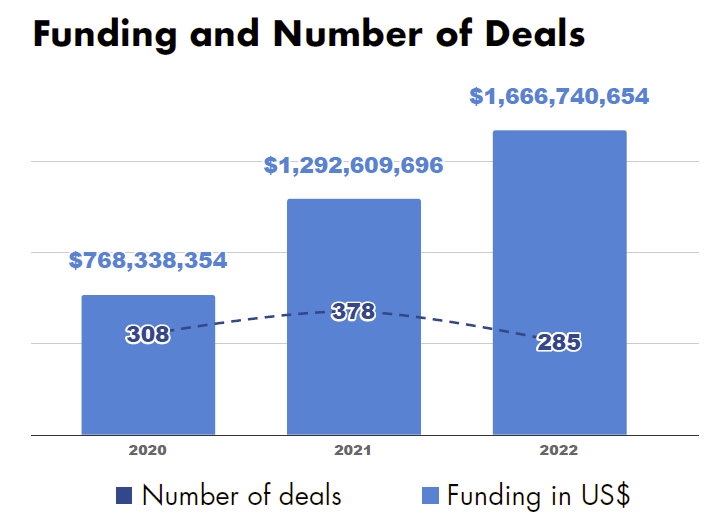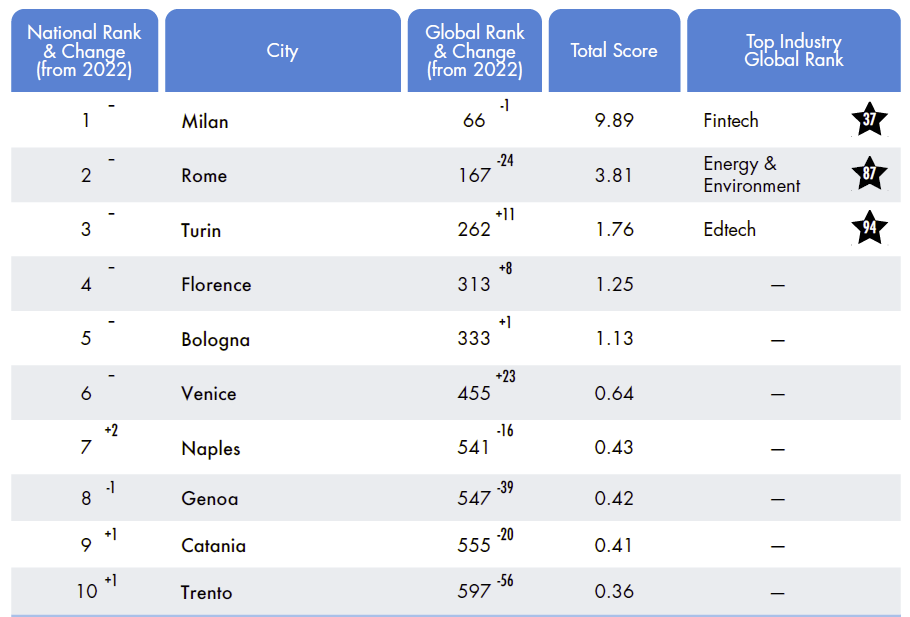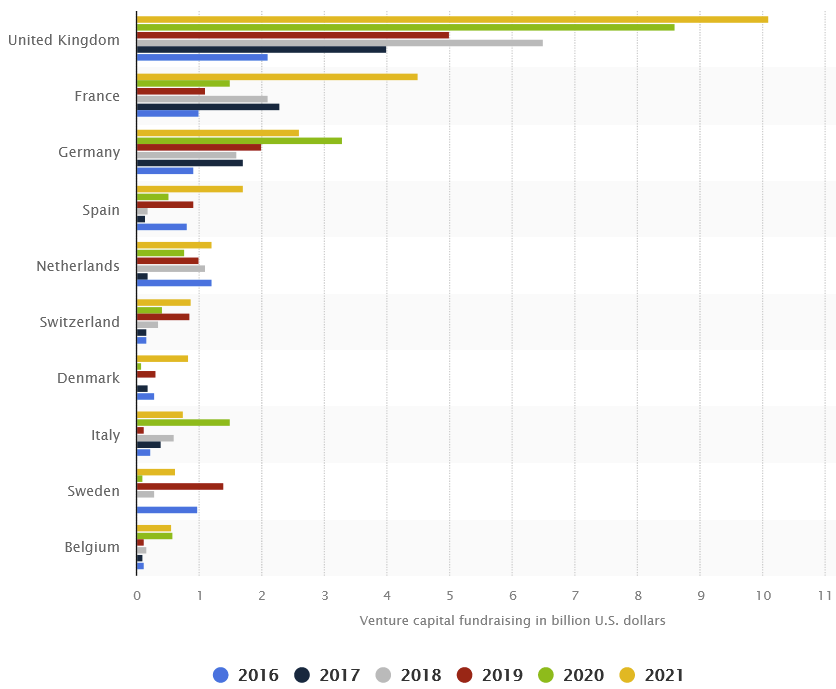
Italy startup ecosystem report 2023
Italy’s entrepreneurial roots run deep, spanning industries as diverse as fashion and aerospace. Despite this, many consider the country’s startup ecosystem an under-the-radar gem within Europe, often overlooked despite its growing potential.
In 2022, two startups based in Milan achieved unicorn status – Satispay and Scalapay. These successes marked the first of their kind for Italy and solidified Milan's position as a major fintech innovation hub within Europe's startup scene – and will likely serve as inspiration for more entrepreneurial initiatives.
According to StartupBlink, Italian startups successfully secured a total of €1.54 billion through 285 deals in the year 2022. This marked an impressive 30% surge in funding when compared to 2021. However, the number of funding deals in 2022 decreased by 25% compared to the preceding year, which had seen a total of 378 deals. Essentially, 2022 brought in more funding – yet for a reduced number of startups.

The fintech sector was the top choice for investment among Italian startups in 2022. It attracted €504 million in venture capital. Health industry startups came next with a solid €348 million, and real estate secured the third position with a total of €186 million, according to Dealroom data.
Let's take a closer look at the Italian startup landscape – where the action is, recent wins, and how things are going overall in this ecosystem.
New initiatives to support the startup ecosystem
Over the past few years, the Italian government has implemented measures to enhance the startup ecosystem. In 2020, Italy's government initiated an investment plan to support local entrepreneurs and created CDP Venture Capital – meant for startups and SMEs working in sectors that contribute to the country's growth and competitiveness.
Recent initiatives include CDP Venture Capital and SIMEST joining forces to launch a new phase of the Venture Capital Fund (VCF), focusing on boosting young, high-tech companies with international potential.
Under this initiative, SIMEST will contribute EUR 200 million to the VCF: 50 million will be co-invested alongside CDP Venture Capital, strengthening global growth efforts for Italian startups; 150 million will be directed to an International Fund of Funds by CDP Venture Capital, attracting global investors to support the local startup ecosystem.
Italy's government is also gearing up to establish an investment fund, supported by state lender CDP, to foster AI-focused startups. The aim of this initiative is to advance AI study, research, and programming in Italy. Reuters reports that the government intends to allocate about €150 million for this endeavor.
Italy's startup ecosystem: Milan, Rome, and beyond
Thanks to its business-focused outlook and availability of VC funds, Milan is considered the startup capital of the country. The city is Italy's economic and financial center– featuring a skilled workforce, strong industrial sectors, and a lively cultural scene.
According to data from the Ministry of Enterprises and the Made in Italy report for the first quarter of 2023, Milan has the most innovative startups. These are defined as startups that are less than five years old, make less than €5 million in annual revenue, are not publicly traded, and meet certain technology criteria set by the government.
- By the end of Q1 2023, Milan had 2,669 innovative startups, which is 19% of the total in the country.
- Rome came in second with 1,667 startups, making up 11.9% of the total.
- Other cities had significantly fewer innovative startups in comparison. The top five also included Naples, with 736 startups (5.3%), Turin, with 538 startups (3.8%), and Bologna, with 355 startups (2.5%).
Milan houses multiple renowned universities and research centers like Politecnico di Milano and Bocconi University, fostering a continuous flow of talent and ideas. Recently, Milan has witnessed the rise of coworking spaces, incubators, and accelerators that offer support and resources to early-stage startups. Highlights include Talent Garden Milano, Impact Hub Milano, and PoliHub.
TechChill Milano and similar events also play a vital role in connecting the dots between knowledge, skills, and networking. By uniting key personalities from startups and related fields, these events make way for strong and lasting business connections.
According to Ferruccio Martinelli, Operations and Platform Manager at Bocconi for Innovation, "Events like TechChill are helping by opening up the ecosystem to international investments, knowledge, and opportunities, especially at the seed stage where startups usually don't get that kind of exposure."
The eternal city of Rome ranks as Italy's second most bustling startup hub. The city boasts over twenty universities, including La Sapienza and Luiss, which have actively supported startups and young entrepreneurs.
Currently, Milan and Rome lead the startup scene, but other cities are also gradually establishing their presence. As per the StartupBlink Global Startup Ecosystem Index 2023, other major Italian cities like Turin, Florence, Bologna, and Venice have all advanced their positions in the index compared to the previous year. For example, Turin has achieved a spot in the top 100 global ecosystems for Edtech startups.

Fintech unicorns leading the way
In 2022, Italian fintech startups experienced a remarkable year as both Scalapay and Satispay reached unicorn status. These two companies became the first-ever startups in the country to accomplish this significant milestone.
Scalapay
Founded in 2019, Scalapay is a buy-now-pay-later service that enables users to split their payments into three, without any interest, when making purchases. This is achieved through integration with online store checkouts.
During the pandemic, the rise of buy-now-pay-later services became a notable trend in the e-commerce market. Scalapay achieved unicorn status in 2022 with a valuation of €1 billion and now serves more than 3.5 million users across Europe.
Satispay
Satispay offers a payment system that lets users send money to friends and make in-store payments using their smartphones.
Founded in 2013, Satispay is part of a growing trend of services that aim to create their own payment systems, avoiding the often slower and more expensive methods used by traditional banks. In the fall of 2022, the company secured €320 million through an all-equity funding round, propelling its valuation past the €1 billion mark.
Italy's up-and-coming startups
While fintech is getting a lot of attention, Italy has also seen promising startups in other fields, from the green economy to real estate. Let's take a look at some prime examples.
Energy Dome
Established in 2020, an Italian climate-focused startup called Energy Dome has created a CO2 Battery for storing renewable energy. They use a closed-loop process involving CO2 to capture energy from sources such as solar power.
Storing energy matters for renewables since sources like sunlight and wind can change due to weather. Smart energy storage solutions could have a significant role in our move towards greener electricity – and this is precisely the purpose of Energy Dome's CO2 Battery.
So far, Energy Dome has secured over €90 million, with the latest Series B funding round in July 2023 contributing €15 million.
Casavo
Founded in 2017, Casavo is another promising startup from Milan. Their goal is to speed up the often sluggish real estate buying and selling process by shifting it online. Casavo’s smart digital platform matches sellers' needs with buyers' preferences.
Casavo assists sellers in listing their properties on its online marketplace. They promise a sale within 30 days; if no buyers are interested, they buy the property directly. Their algorithm provides instant property valuations. The startup earns money by taking a portion of sales from third-party buyers. They also provide a renovation service, aiming to make homes move-in ready.
They've raised €708.9 million from investors and currently provide services in Milan, Rome, Turin, Bologna, and Florence.
Cubbit
Established in 2016 in Bologna, Cubbit provides distributed peer-to-peer network cloud storage solutions. Cubbit uses machine learning algorithms to organize data distribution across the network.
These algorithms handle security, metadata, and optimization, aiming to reduce delays and bandwidth use while maximizing storage efficiency. Cubbit states that their distributed infrastructure costs up to ten times less than traditional data centers, saving 40,000 kg of CO2 emissions annually for each Petabyte of storage. They also employ zero-knowledge encryption – ensuring that not even Cubbit can access a customer's data.
They've secured €11 million in funding and have a customer base of over 5,000.
Italy's startup scene – still plenty of untapped potential
With Italy joining the unicorn club, we can expect its startup scene to kick into higher gear in the coming years. But that also hinges on whether the country tackles the issues currently holding back potential entrepreneurs.
According to the Startup Wise Guys accelerator, being a founder in Italy is not exactly a walk in the park. Founders rated their capital-raising experience at an average of 6.5 out of 10.
The StartupBlink Global Startup Ecosystem Index 2023 reflects a similar viewpoint. Italy sits at the 30th spot – not great, not terrible – nestled between Russia and New Zealand in the rankings. According to the report, Italy would benefit from improving startup regulations, making tax policies friendlier, getting more small and medium-sized businesses on board, and simplifying the bureaucracy involved.
As the report highlights, in contrast to other major European economies like Germany, the UK, France, Spain, and the Netherlands, Italy doesn't make it into the global top 25 for any of the core industries. This suggests that the startup ecosystem in Italy is a bit behind its EU peers.
Ferruccio Martinelli agrees: "The 4th largest European economy is still lagging far behind in terms of VC funding per capita, and we take this as the main metric to address going forward."

Looking at the bright side, this suggests that the Italian startup scene has nowhere to go but up.
Italy has plenty lot of talent – after all, the country has produced 21 Nobel laureates. In The Times Higher Education World University Rankings 2023, 25 Italian universities have made it into the global top 500.
Ferruccio argues, "To elevate the ecosystem to the next level, we strongly believe in fostering a stronger entrepreneurial culture in universities. If startups become the preferred choice for the 300k students graduating each year, you can anticipate systemic shifts across the economy in just a few years' time, aligning with the ongoing evolution of VCs and LPs investing in Italy. That’s our North Star."
So far, we've seen Italian startups flourish despite obstacles. It's fair to say that with a friendlier environment, the country has the potential to work wonders in fostering great entrepreneurship.

